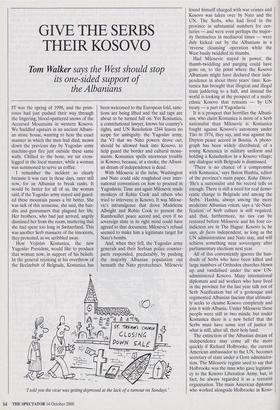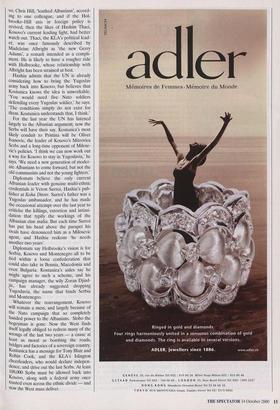GIVE THE SERBS THEIR KOSOVO
Tom Walker says the West should stop
its one-sided support of the Albanians
IT was the spring of 1998, and the prim- roses had just pushed their way through the lingering, blood-spattered snows of the Accursed Mountains in western Kosovo. We huddled upstairs in an ancient Albani- an stone house, wanting to hear the exact manner in which the men had died, mown down the previous day by Yugoslav army machine-gun fire just outside these same walls. Chilled to the bone, we sat cross- legged in the local manner, while a woman was summoned to serve us coffee.
I remember the incident so clearly because it was rare in those days, rarer still now, for an Albanian to break ranks. It would be better for all of us, the woman said, if the Yugoslav army stayed and guard- ed these mountain passes a bit better. She was sick of this nonsense, she said, the ban- dits and gunrunners that plagued her life. Her brothers, who had just arrived, angrily dismissed her from the room, muttering that she had spent too long in Switzerland. This was another Serb massacre of the innocents, they protested, as we scribbled away.
How Vojislav Kostunica, the new Yugoslav President, would like to produce that woman now, in support of his beliefs. In the general rejoicing at his overthrow of the Beelzebub of Belgrade, Kostunica has been welcomed to the European fold, sanc- tions are being lifted and the aid taps are about to be turned full on. Yet Kostunica, a constitutional lawyer, knows his country's rights, and UN Resolution 1244 leaves no scope for ambiguity: the Yugoslav army, the VJ that we Nato powers drove out, should be allowed back into Kosovo, to help guard the border and cultural monu- ments. Kostunica spells enormous trouble in Kosovo, because, at a stroke, the Albani- an dream of independence is dead.
With Milosevic at the helm, Washington and Nato could ride roughshod over inter- national conventions on how to proceed in Yugoslavia. Time and again Milosevic made monkeys of Robin Cook and others who tried to intervene in Kosovo. It was Milose- vic's intransigence that drove Madeleine Albright and Robin Cook to present the Rambouillet peace accord and, even if no sovereign state in its right mind could have agreed to that document, Milosevic's refusal seemed to make him a legitimate target for Nato's bombs.
And, when they fell, the Yugoslav army generals and their Serbian police counter- parts responded, predictably, by pushing the majority Albanian population out beneath the Nato pyrotechnics. Milosevic I told you the vicar was getting depressed at the lack of a turnout on Sundays.' found himself charged with war crimes and Kosovo was taken over by Nato and the UN. The Serbs, who had lived in the province in substantial numbers for cen- turies — and were even perhaps the major- ity themselves in mediaeval times — were duly kicked out by the Albanians in a `reverse cleansing' operation while the West busily twiddled its thumbs.
Had Milosevic stayed in power, the thumb-twiddling and purging could have gone on, to the point where the Kosovo Albanians might have declared their inde- pendence in about three years' time. Kos- tunica has brought that illogical and illegal train juddering to a halt, and instead the world is looking at the prospect of a multi- ethnic Kosovo that remains — by UN treaty — a part of Yugoslavia.
It is a prospect that horrifies the Albani- ans, who claim Kostunica is more of a Serb nationalist than Milosevic is. Kostunica fought against Kosovo's autonomy under Tito in 1974, they say, and was against the Dayton peace accord in Bosnia. A photo- graph has been widely distributed, of a young Kostunica in military uniform and holding a Kalashnikov in a Kosovo village; any dialogue with Belgrade is dismisssed.
`There is no chance of a compromise with Kostunica,' says Baton Haxhiu, editor of the province's main paper, Koha Ditore. `He's a nationalist and his record tells us enough. There is still a need for real demo- cratic change in Belgrade and among the Serbs.' Haxhiu, always among the more moderate Albanian voices, says a `de-Nazi- fication' of Serb culture is still required, and that, furthermore, no ties can be restored before Milosevic and his four co- indictees are in The Hague. Kosovo is, he says, de facto independent, as long as the UN administration and Nato stay, and will achieve something near sovereignty after parliamentary elections next year.
All of this conveniently ignores the hun- dreds of Serbs who have been killed and large numbers of Orthodox churches blown up and vandalised under the new UN- administered Kosovo. Many international diplomats and aid workers who have lived in the province for the last year talk not of Serb Nazification but of a grotesque and regimented Albanian fascism that ultimate- ly seeks to cleanse Kosovo completely and join it with Albania. Under Milosevic these people were still in two minds; but under Kostunica there is a new belief that the Serbs must have some sort of justice in what is still, after all, their holy land.
The extinction of the Albanian dream of independence may come all the more quickly if Richard Holbrooke, the current American ambassador to the UN, becomes secretary of state under a Gore administra- tion. The Milosevic regime used to say that Holbrooke was the man who gave legitima- cy to the Kosovo Liberation Army, but, in fact, he always regarded it as a terrorist organisation. The main American diplomat who worked alongside Holbrooke in Koso- vo, Chris Hill, 'loathed Albanians', accord- ing to one colleague, and if the Hol- brooke-Hill axis in foreign policy is revived, then the likes of Hashim Thaci, Kosovo's current leading light, had better watch out. Thaci, the KLA's political lead- er, was once famously described by Madeleine Albright as 'the new Gerry Adams', a remark intended as a compli- ment. He is likely to have a rougher ride with Holbrooke, whose relationship with Albright has been strained at best.
Haxhiu admits that the UN is already considering how to bring the Yugoslav army back into Kosovo, but believes that Kostunica knows the idea is unworkable. `You would need five Nato soldiers defending every Yugoslav soldier,' he says. The conditions simply do not exist for them. Kostunica understands that, I think.'
For the last year the UN has listened largely to the Albanian argument; now the Serbs will have their say. Kostunica's most likely conduit to Pristina will be Oliver Ivanovic, the leader of Kosovo's Mitrovica Serbs and a long-time opponent of Milose- vic's policies. 'I think we can now work out a way for Kosovo to stay in Yugoslavia,' he says. 'We need a new generation of moder- ate Albanians to come forward, but not the old communists and not the young fighters.'
Diplomats believe the only current Albanian leader with genuine multi-ethnic credentials is Veton Surroi, Haxhiu's pub- lisher at Koha Ditore. Surroi's father was a Yugoslav ambassador, and he has made the occasional attempt over the last year to criticise the killings, extortion and intimi- dation that typify the workings of the Albanian clan mafia. But each time Surroi has put his head above the parapet his rivals have denounced him as a Milosevic agent, and Haxhiu reckons 'he needs another two years'.
Diplomats say Holbrooke's vision is for Serbia, Kosovo and Montenegro all to be tied within a loose confederation that could also take in Bosnia, Macedonia and even Bulgaria. Kostunica's aides say he might agree to such a scheme, and his campaign manager, the wily Zoran Djind- Jic, has already suggested dropping Yugoslavia, the name that binds Serbia and Montenegro.
Whatever the rearrangement, Kosovo will remain a mess, and largely because of the Nato campaign that so completely handed power to the Albanians. Slobo the bogeyman is gone. Now the West finds itself legally obliged to redress many of the wrongs of the last two years — a cause at least as moral as bombing the roads, bridges and factories of a sovereign country. Kostunica has a message for Tony Blair and Robin Cook, and the KLA's Islington cheerleaders, who would declare indepen- dence, and drive out the last Serbs. At least 100,000 Serbs must be allowed back into Kosovo, along with a federal army once trusted even across the ethnic divide — and now the West must deliver.



















































































 Previous page
Previous page